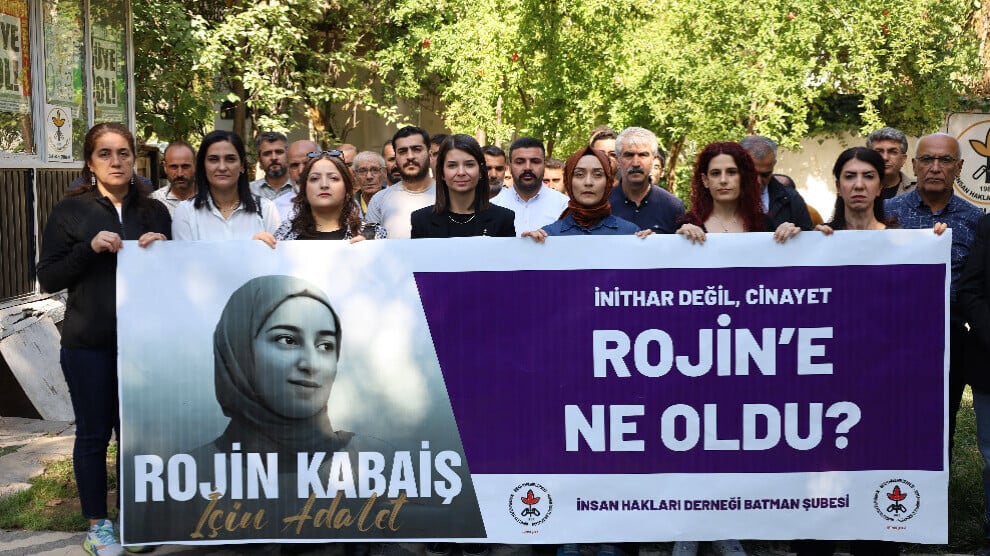The Human Rights Association (IHD) has called for a comprehensive investigation into the death of Kurdish student Rojin Kabaiş. In a press conference held simultaneously in several provinces, the association sharply criticized state institutions, stating that structures such as the Ministry of Justice and the Forensic Medicine Institute are contributing to the cover-up of gender-based violence through their behavior.
The coordinated press conferences took place in Van, Urfa, Batman, Dersim, Izmir, Mersin, Adana, and Antalya, with the central statement read out by the IHD Women’s Commission in each case.
Criticism of impunity and lack of protection
In Van, Ayten Kıran, co-chair of the provincial IHD branch, stated that protective mechanisms for women have been measurably weakened since Turkey’s withdrawal from the Istanbul Convention in 2021. She pointed out that the state is not adequately fulfilling its duty to protect women from violence and guarantee their right to life. This applies not only to the case of Rojin Kabaiş, but to numerous unsolved deaths of women throughout the country, she added.
“The practice of impunity violates women’s right to life, access to justice, and effective investigations,” said Kıran. The IHD accuses the Forensic Medicine Institute in particular of issuing expert opinions that serve the alleged perpetrators rather than the truth. This often forces relatives to fight for justice for years—while constantly endangering their safety.
Key demands of the IHD
The IHD calls on the Ministry of Justice, Forensic Medicine Institute, the parliamentary human rights commission, bar associations, women’s rights centers, and civil society as a whole to advocate for an independent and transparent investigation. The main demands are:
▪ Thorough and effective investigations in the Rojin Kabaiş case and in all cases of suspected femicide;
▪ An end to the monopoly of state forensic medicine in the collection of evidence—instead, independent medical reports should also be legally recognized;
▪ Reintroduction of the Istanbul Convention and associated protection mechanisms for women;
▪ Clear action against impunity for violence against women, including state complicity where applicable.
Clear messages from women
The declaration was read out in numerous cities in the presence of local party representatives, civil society groups, and women’s initiatives. In Izmir, the DEM Party took part in the event. In Mersin, posters with slogans such as “What happened to Rojin?”, “We know the perpetrator,” and “Lift the confidentiality in the case” were displayed.
In other cities, the messages were similar: “Rojin’s death was not suicide – it was murder,” “Femicide is political,” and “Justice for Rojin.” These slogans reflect growing concern about the rising number of unsolved femicides and what is perceived as inadequate government action to combat them.
The Rojin Kabaiş case
Rojin Kabaiş was a student at Yüzüncü Yıl University in Van. In October 2024, the 21-year-old was found dead 18 days after her disappearance from a dormitory on the shores of Lake Van. The investigating authorities quickly put forward the theory of suicide—an interpretation that was strongly questioned by her family and their legal counsel from the outset. It is now known that a forensic report contains evidence of possible sexual violence—two male DNA traces were found on sensitive parts of the body.
The circumstances surrounding Rojin’s death, the response of the authorities—information about male DNA traces on Rojin’s body only became known around a year after her death—and the progress of the investigation to date raise many questions from the perspective of human rights organizations and relatives. The IHD speaks of a possible femicide and calls for complete transparency, particularly with regard to the investigation, the medical reports, and the assessments by the public prosecutor’s office.
Rojin Kabaiş’s family is also demanding clarification as to why the rector of the University of Van, Hamdullah Şevli, who sat in the Turkish parliament for several years for the ruling AKP, participated in Rojin Kabaiş’s autopsy without any medical qualifications. The family is also demanding that the confidentiality order on the investigation file be lifted.
Source: ANF News


